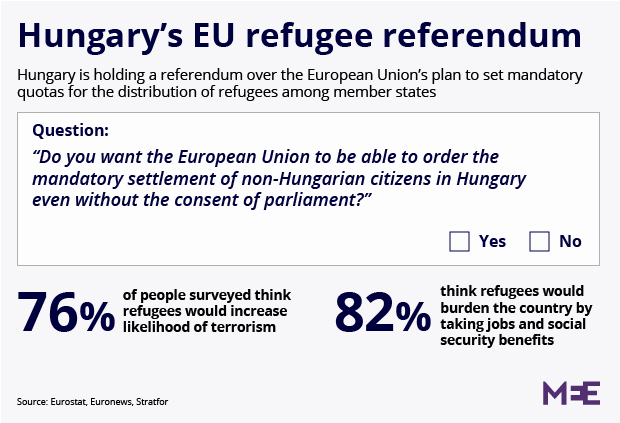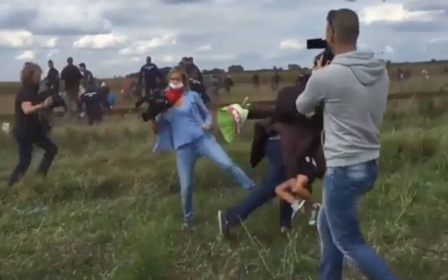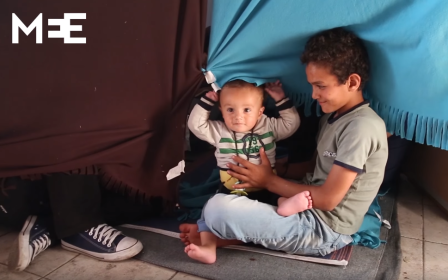Hungarian Muslims 'feel the hate' as vote on migrants looms
Maja is no immigrant, she's a Muslim convert. But in the febrile atmosphere in Hungary ahead of Sunday's referendum on refugees, she says her religion has made her a target for abuse.
"We Hungarians are normally kind, friendly people. I don't know what is happening to us, but something is really not right now," the 33-year-old financial services employee told AFP.
"People say things all the time," the mother-of-one said in a phone interview. "Once I was knocked off a bicycle by a driver who said 'Why don't you back to the desert!'"
Only this week she was assaulted in broad daylight at a petrol station. She leaves her headscarf in the car when she goes to work or parent-teacher meetings for the sake of her son.
Fellow convert Maria Nagy, standing at the counter of the Asian goods shop she runs with her Pakistani husband in the multi-cultural eighth district of Budapest, has had similar experiences.
"We feel the hate. On the tram, ticket controllers hassle me all the time because I wear the scarf. If I go to a restaurant people stare at me," the 30-year-old said.
Their experiences are not shared by all Muslims in Hungary, but groups representing the 40,000-strong minority community say discrimination and race hate are on the rise.
Immigration is 'poison'
The referendum is about whether Hungary will accept one of the European Union's main responses to the continent's migrant crisis, that of sharing refugees around the bloc via mandatory quotas.
Prime Minister Viktor Orban is backing a "No" vote and is almost certain to win, inflaming tensions with his western European partners which have heavily criticised his hardline anti-migrant nationalism.
Ignoring this, his government has plastered lampposts and billboards nationwide with posters linking immigration - which Orban calls "poison" - with terrorism and crime.
Zoltan Bolek, another convert and head of Hungary's oldest Muslim group, the Hungarian Islamic Community set up in 1990, said this has further soured the ugly atmosphere.
"The coded message is that migrants are Muslims, who are terrorists or criminals. Also state media keeps putting out stories about anything a Muslim has done or is alleged to have done somewhere," Bolek told AFP.
A letter he sent last week to Orban appealing for physical protection for mosques has gone unanswered so far.
"This is the situation where we have reached, people's souls have been poisoned," Bolek said.
'Like the 1930s'
Zoltan Sulok, the softly-spoken president of Organisation of Muslims in Hungary, the larger of the two main religious groups, said that many in the community are children and grandchildren of 1980s immigrants, not new arrivals.
"They speak Hungarian, supported Hungary in the European football championships, what should they think if someone now tells them 'Go home'?" he said.
The prayer room in the Budapest Mosque - a large but nondescript building devoid of nameplate or minaret so as not to attract attention - has space for 2,000 worshippers, by far the largest of the city's handful of mosques.
It gets 200-300 for Friday prayers but is full on festivals like Eid.
"Until now we lived quite peacefully, because we were not a political issue. But now we started to be," he said. He even likens the situation to the 1930s, with migrants "dehumanised" by politicians and the media.
"It's a very dangerous game that politicians are playing," he said.
Portraying himself as the defender of Christian Europe against Islamisation, Orban says the EU has no right to "redraw Europe's cultural and religious identity".
He and other leaders in eastern Europe reject what they see as a failed experiment with multiculturalism in the West, pointing to social tensions and home-grown terrorism as the results.
But support in the referendum campaign sometimes comes from unlikely quarters.
Maher Zaki is a 43-year-old trader who arrived from Syria 25 years ago "with nothing, no money, no knowledge of the language". He helped organise medical aid for Syrian migrants last year during the peak of the crisis.
"Orban's policies protect my son and my family as well as Hungary," Zaki, now fluent in Hungarian, told AFP in a Budapest cafe, referring to cases of Islamic State extremists arriving in Europe as asylum seekers.
"I don't want to walk in town centres among people who might be about to kill and bomb innocent people."
He added: "Of course there is huge propaganda against us, but if people come to live in my house, I accept them but I want to check who they are before they come through the door."
New MEE newsletter: Jerusalem Dispatch
Sign up to get the latest insights and analysis on Israel-Palestine, alongside Turkey Unpacked and other MEE newsletters
Middle East Eye delivers independent and unrivalled coverage and analysis of the Middle East, North Africa and beyond. To learn more about republishing this content and the associated fees, please fill out this form. More about MEE can be found here.





